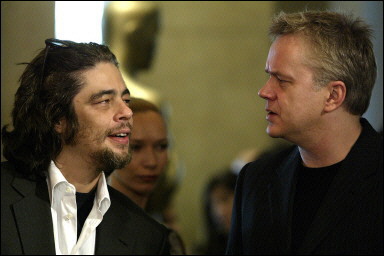
Month / February 2004
I Guess So
The Guardian asks Ursula K. Le Guin a few questions. She spends much time clarifying opias and isms, and, at one point, even impersonates the French.
A Canadian realtor made the find of a lifetime when she put the late Marian Engel’s house on the market. Hundreds of letters were thrown away in garbage bags, from such heavy-hitters as Robertson Davies, Alice Munro, and Margaret Atwood, many of them of a very private nature. “Dear Marian,” read one. “Robertson keeps speaking in naughty epigrams. Do you know anyone who can drown Robertson in paper and get him to shut up?”
Mark Evanier has a tribute up to the recently departed Julius Schwartz. Schwartz was a tremendous figure in comic book and science fiction circles.
Locus has a recommended reading list up for 2003’s books, along with a tally rundown, essays from Claude Lalumière and Cynthia Ward. One Locus editor has promised science fiction fans that this incredible coverage was intentional, and that “it will be impossible for any of you to keep up.”
Time, of all places, tackles the troubling new territory of dude-lit. Although in Kyle Smith’s case, perhaps monkey lit might be a better term.
Frances Partidge, the last of the Bloomsbury set and a lady who had the decency to avoid Danny Bonaduce, has passed on at 103.
Michiko compares Thoreaux’s new collection to “an embarrassing letter to Penthouse magazine.” But this may have something to do with the unrelated news that men wearing nothing but coats have been buying a lot of extra copies of Old School.
And Padma Lakshimi has been spotted with an engagement ring. Asked if Rushdie, still married to his third wife, plans to marry her, she replied, “I guess so.” However, another journalist was asking Lakshimi about her jeans. So nobody has a definitive answer.
Assault on Carpenter’s 13
It’s bad enough that Hollywood Reporter has announced a remake of Assault on Precinct 13, one of the goofiest and grittiest John Carpenter films to come out of the 1970s. It’s bad enough that Ethan “Whiny Caucasian is My Middle Name” Hawke is slated to star in it. But the true crime here is that Carpenter’s racial dyanamic has been drastically altered for a safer, reactionary age.
One of the beautiful things about Carpenter’s film is that, much like Night of the Living Dead‘s African-American protagonist (whose race was never addressed), Carpenter had the guts to cast Austin Stoker in the aw-shucks, do-goodin’ sheriff role and the white-bread Darwin Joston in the criminal role of Napoleon Wilson (whose unlikely first name was never explained, despite Joston’s repeated offers to “tell you sometime”). Beyond Assault‘s unapologetic shooting of a kid and its guns daringly prodding out of moving cars (in 1976, no less), the film improved upon what could have been just an entertaining low-budget ripoff of Rio Bravo by taking the sheriff-criminal buddy movie dynamic and casting against racial type. It was a nice way of acknowledging the camaraderie, while very subtly suggesting to an exploitation film audience that ultimately one’s skin color didn’t matter when up against a common evil. Who needed Walter Brennan for comedy relief when you had black man and white man trying to defend an abandoned outpost? (Laurie Zimmer’s presence is a side issue I won’t go into.)
Laurence Fishburne’s a great actor, but to cast him as the criminal in the remake and Hawke (any Caucasian for that matter, but especially Hawke, an actor who, let’s face it, we all needed to see bitch-slapped by Denzel in Training Day) reinforces the terrible precedent that Carpenter was working against. Did we learn nothing from the multicultural universe of The Matrix: Reloaded? Did we learn nothing from Lando Calrissian? I fear that Fishburne will come off not so much as a goofball asking for a smoke, but as a mean bastard who momentarily mends his ways, ultimately with his own interests at heart.
One other major change involves this: “As the sun sets and a long night begins, a motley crew of policemen and prisoners reluctantly captained by a cop (Hawke) must band together to fight off a rogue gang that wants to free the mobster.”
Anyone who saw the original knows that the gang simply came out of nowhere and that Napoleon Wilson wasn’t even one of their concerns. Napoleon was just the wrong guy in the wrong place.
But Hollywood, somehow believing that the audience needs explanation, has modified Carpenter’s agile balance to appease their suburban focus groups. Once again, we’ll see an African-American helping Whity, his benevolent protector, and then abdicating back to a state of serfdom.
Criminal, I say. Outright criminal.
Vote Safe, Vote Smart, Vote Crichton

For those voting in the Southern primaries tomorrow, remember that there’s only one person right for the NYTBR editor slot.
True, the NYTBR race has little to do with a boring predetermined primary race. But don’t let that stop you from writing an angry letter to Bill Keller, urging him to hire Sarah Crichton as the new book reviews editor and to keep it smart and literary. Send those letters to:
Bill Keller
Executive Waffler
NEW YORK TIMES
229 West 43rd Street
New York, NY 10036
Be sure to include the phrase, “If you let the Times book coverage go to hell, then how can you shower convincingly?”
Mr. Chris
His last name was unpronouncable. All that was known was that it had a glottal stop, six vowels in succession, and could only be uttered correctly by three living people (none of them friends or family).
This caused problems. Adopting a nom de plume was out of the question. Why betray identity? Why become a Smith or a Jones, when there were already too many of them to be found in the White Pages?
Setting up appointments and meetings was problematic. And he became known among his peers as “Chris,” which was, believe it or not, his first name. But because the receptionists couldn’t depart from surname protocol, because there were traditions and employee handbooks to live up to, thanks to the boys in corporate efficiency, he was often announced as “Mr. Chris” and, if a form field called for “Last Name” and a particular program refused to cooperate, he would often be entered as “Chris Chris.”
It is safe to say that publicity and impeccable reputation did not come to him as easily as happiness. America was a nation that prided itself on easy memory. There had been two Adamses, two Roosevelts and two Bushes as Presidents. Furthermore, it looked pretty likely that a second “JFK” would be running on this year’s Democratic ticket.
He delivered bouquets to anyone, male or female, who could spell his name correctly. This gestures were often mistaken for romantic overtures, when in fact he simply liked to reward attention to detail, something with which he was concerned about in the bedroom, both with himself and other parties.
Pay no attention to the loose slipknot or the wrinkled shirt. There’s more to Chris than appoints the retina.